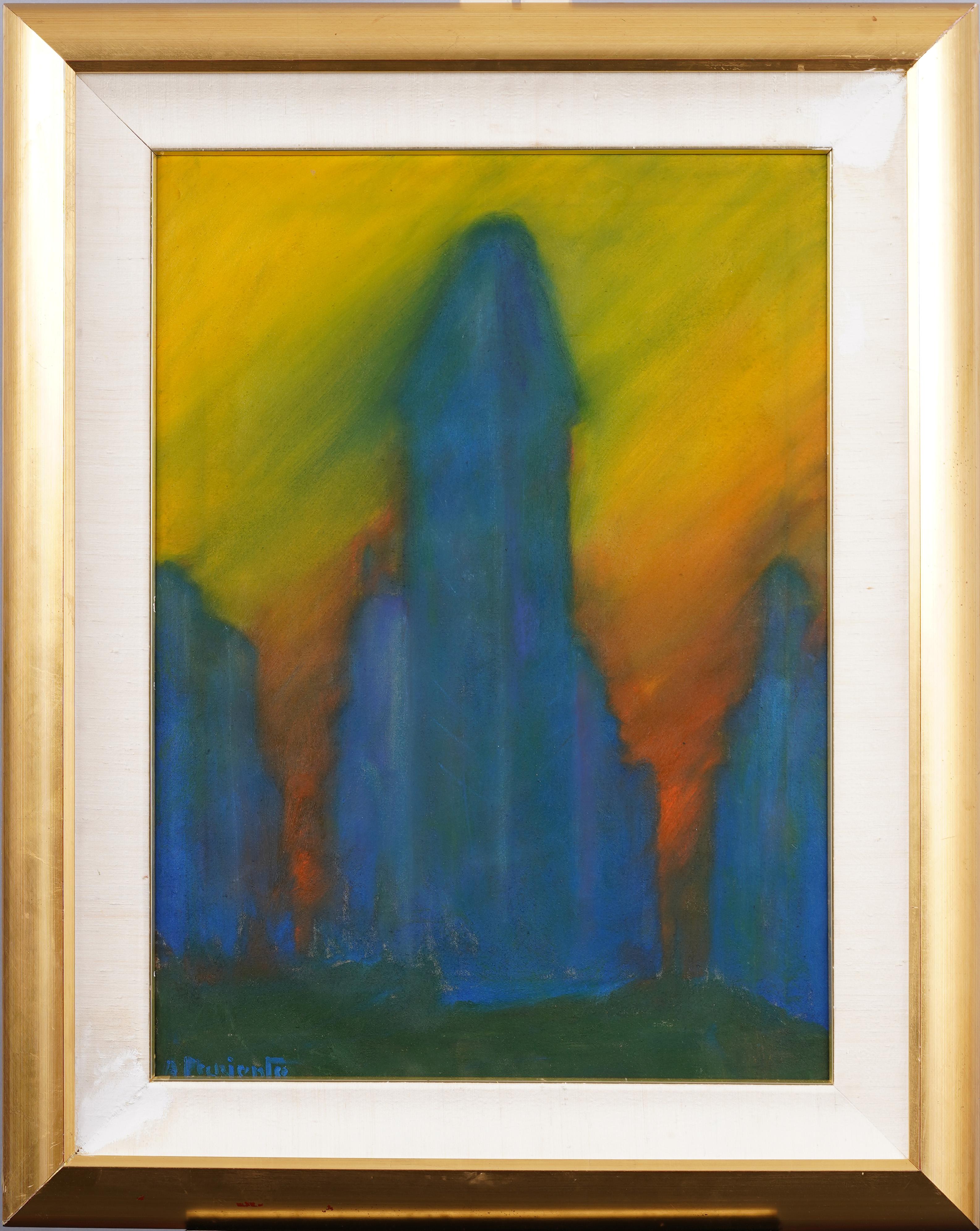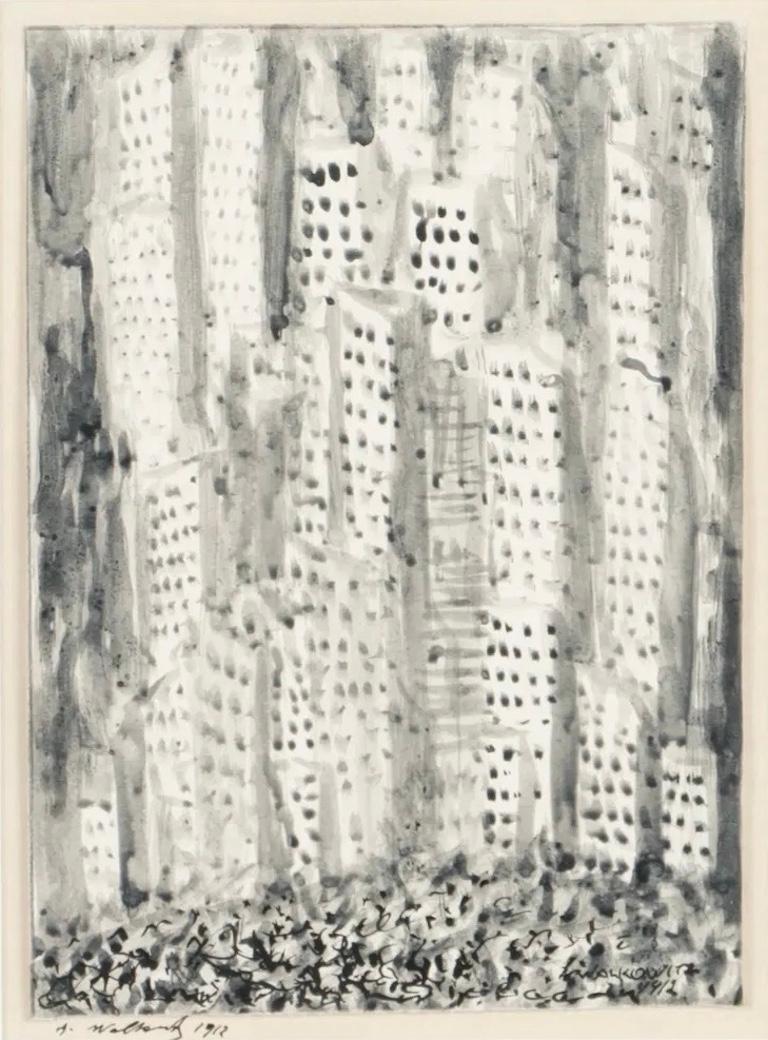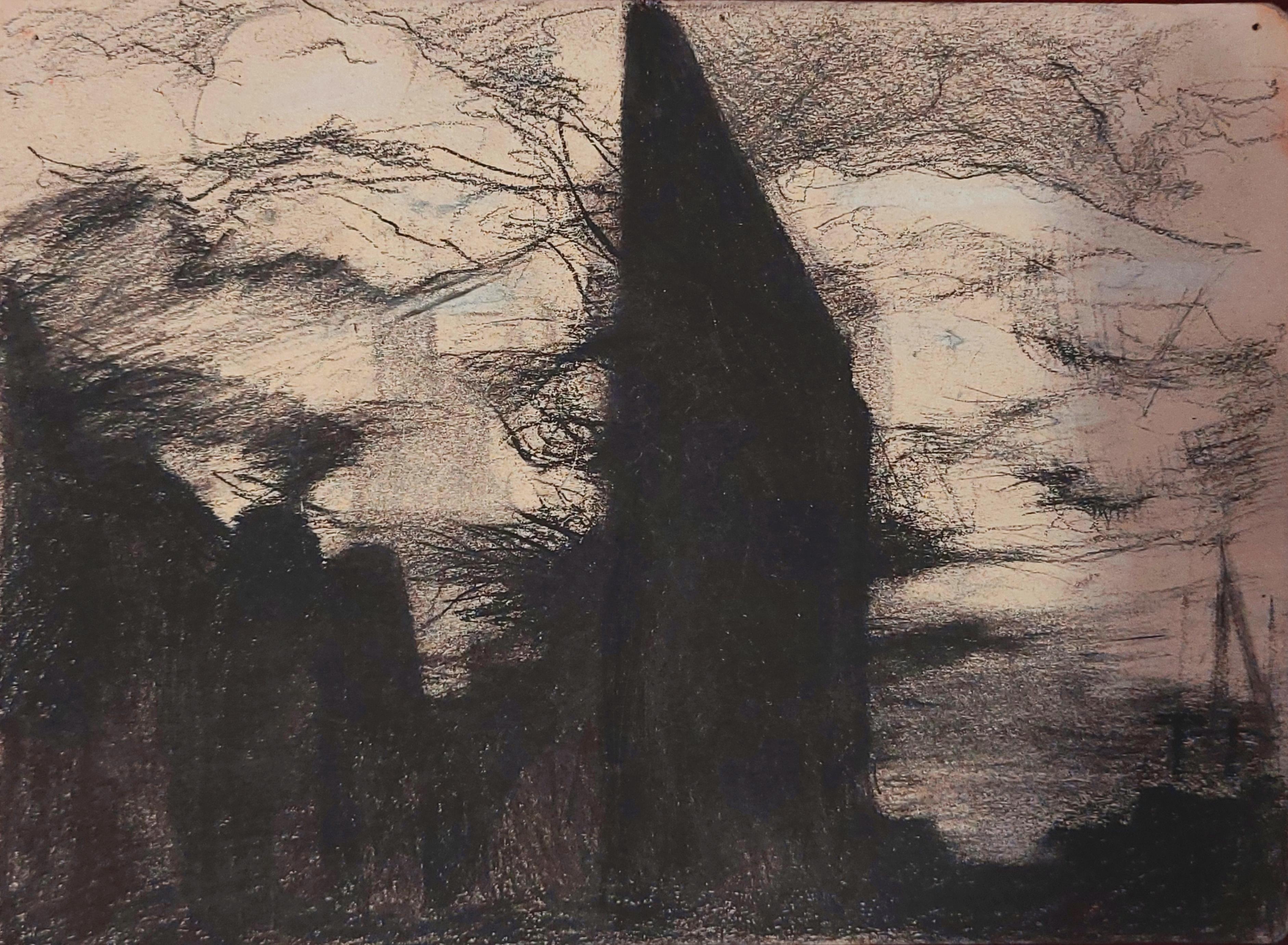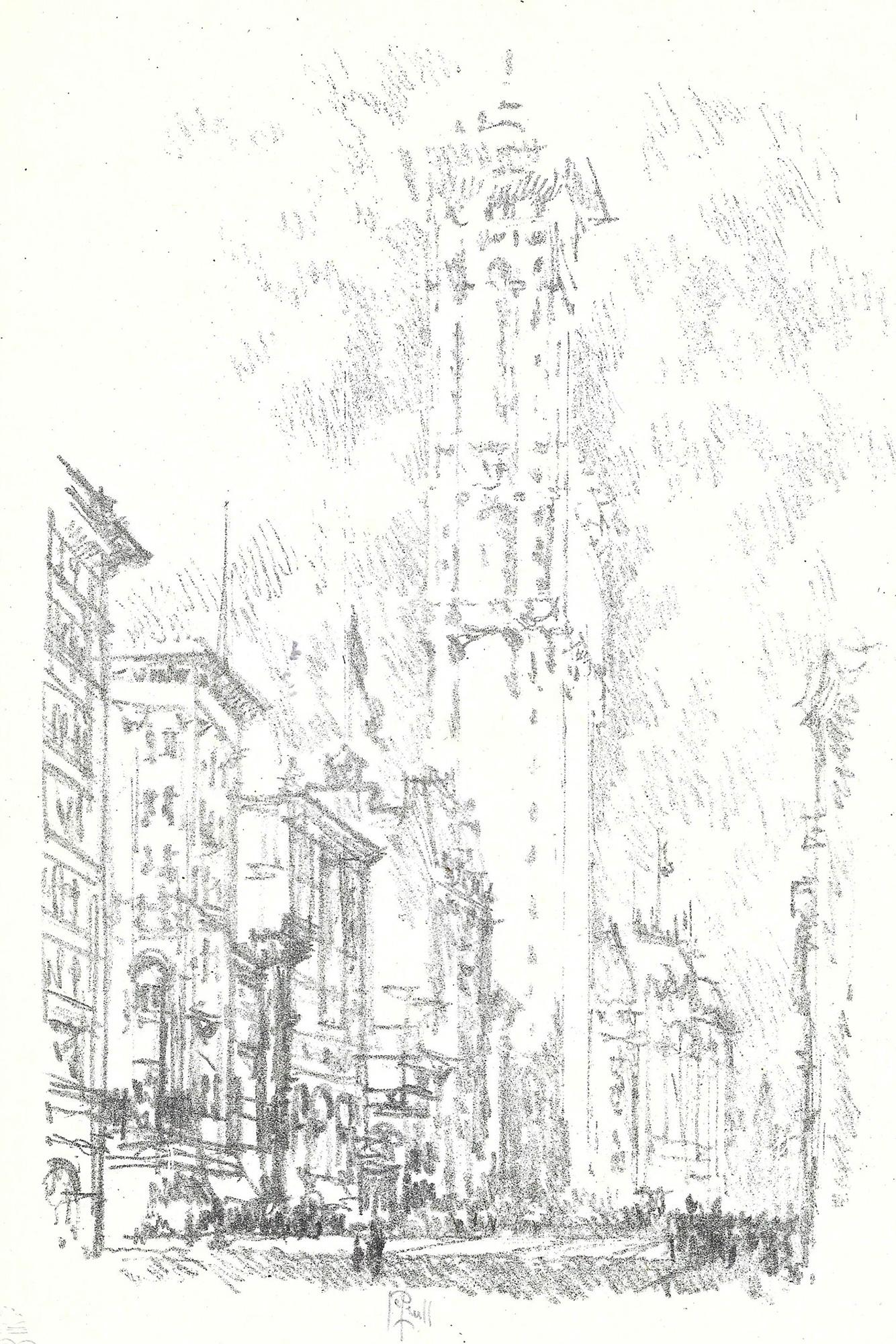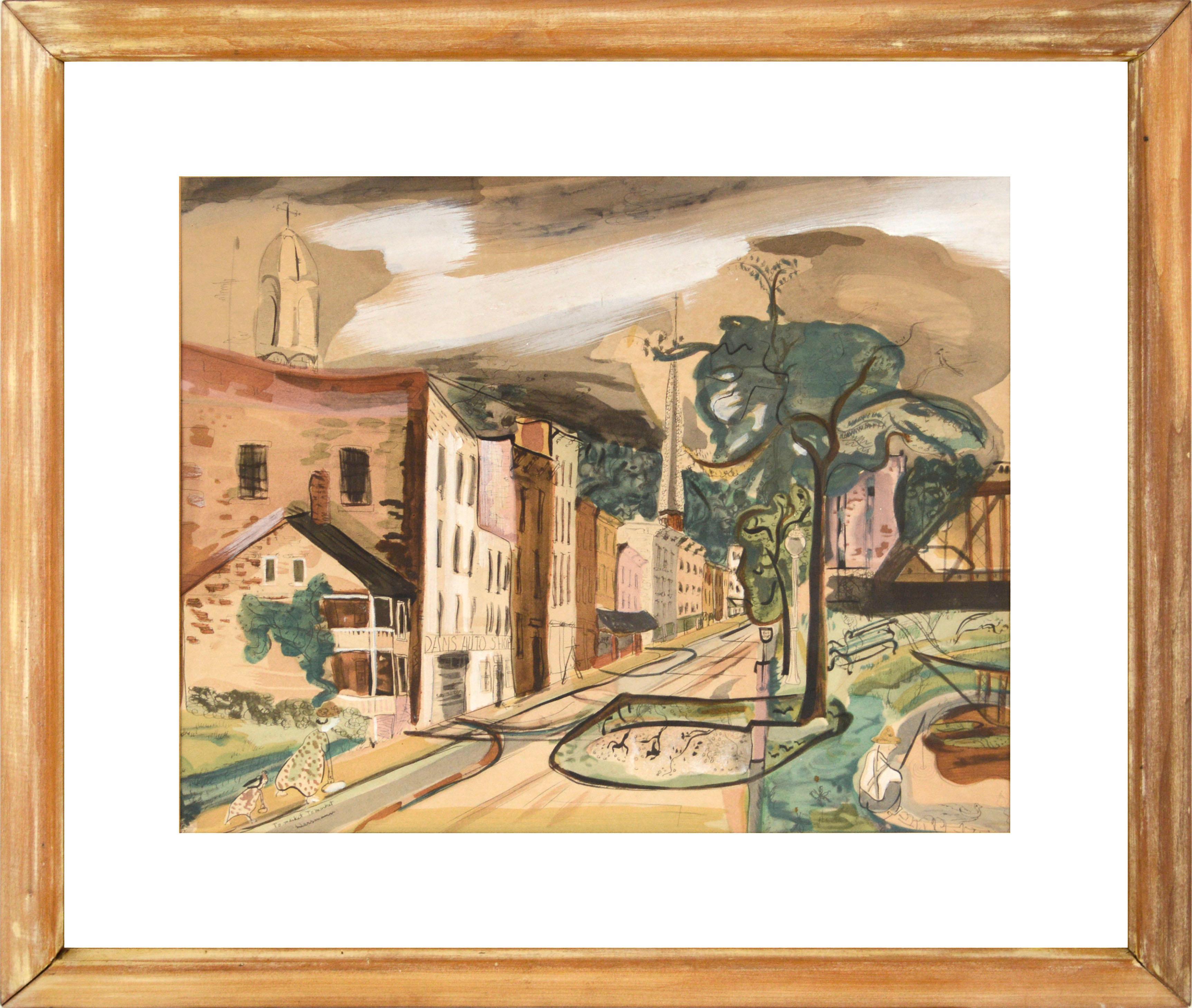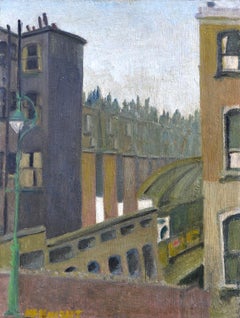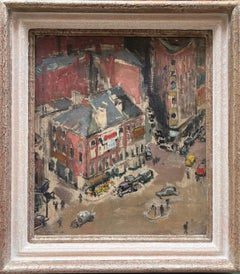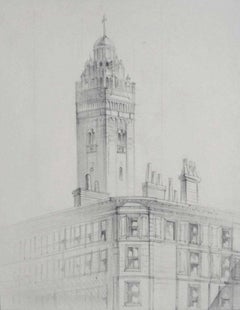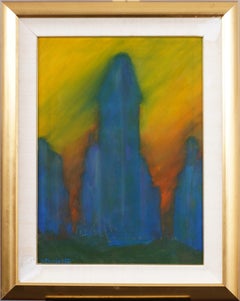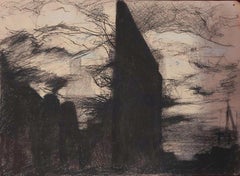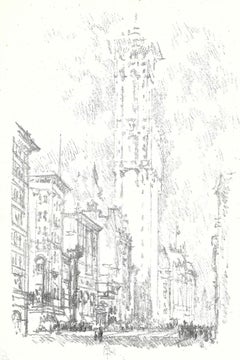Items Similar to Sketch of the Flatiron Building
Want more images or videos?
Request additional images or videos from the seller
1 of 11
Alfred WolmarkSketch of the Flatiron Building1919
1919
$15,583.62
£11,429
€13,261.37
CA$21,455.35
A$23,480.30
CHF 12,407.28
MX$280,252.90
NOK 158,332.33
SEK 144,807.80
DKK 99,055.54
About the Item
Alfred Wolmark
Sketch of the Flatiron Building
1877-1961
Oil on canvas board, unsigned
Image size: 15 1/3 x 11 2/3 inches (39 x 29.5 cm)
Hand-carved contemporary-style frame
Exhibited
Ferens Art Gallery, Hull (March 1975)
Provenance
Collection of Diana Hall (daughter of the artist), New South Wales
Private Collection
Publications
Flatiron Building, New York c1920, private collection; illus. in Dickson, R. & MacDougall, S. (eds.), Rediscovering Wolmark: A Pioneer of British Modernism, Ben Uri Gallery, The London Jewish Museum of Art, London, 2004, p.46
Wolmark completed this sketch when he visited New York in 1919. It depicts the Flatiron Building situated on Broadway, which was the world’s tallest building from its construction in 1902 until 1908. He painted the Flatiron Building multiple times during his stay in America, with one such painting hanging in the New York office of the UK Mission to the United Nations. Therefore, this sketch would have been a crucial preliminary step in the creation of Wolmark’s finished pieces.
The sketch demonstrates what Wolmark was best known for - his pioneering use of colour and brushstroke. The sky is denoted by a variety of blue shades and short but broad brushstrokes, creating the impression of a clouded sky. The buildings in the background are painted in a mauve palette, giving the impression of a stormy sky reflecting off of glass and red brick. In the centre of the painting is the titular Flatiron Building, depicted as a towering monolith in a green palette that juxtaposes with the blue and purple it is set against. The colour combinations - green, blue, mauve - seem, in theory, to be bizarre choices, but it is impossible to maintain this belief when one sees the sketch for themself. Wolmark’s use of colour is masterful, and it becomes clear why he was afforded the moniker of ‘The Colour King’.
There is an air of spontaneity to the work, which is only furthered by the blurry figures rushing about in the bottom of the painting. Wolmark has captured modernity in a single work - a looming building that symbolises industrial and modern architecture, and the busy lives of those commuting to and from work just outside its doors.
Alfred Wolmark
Alfred Aaron Wolmark was born in 1877 to a Jewish family in Warsaw, who fled to Devon under threat of the horrific pogroms sweeping across Eastern Europe. Soon into living in England, the Wolmark family relocated to the Spitalfields area of London to live alongside other Jewish refugee families. Wolmark became a British citizen when he was 17.
In the 1890s, Wolmark began to study at the Royal Academy School and regularly exhibited there until 1936. He returned to Poland in 1903 to paint scenes associated with his Jewish identity, concentrating on elements of faith rather than persecution. Wolmark had his first solo exhibition in 1905 at the Bruton Galleries, followed by inclusion in the 1906 Jewish Art and Antiquities Exhibition in Whitechapel Art Gallery. This latter exhibition garnered a lot of attention for the young artist and marked the beginning of a fruitful partnership with the Whitechapel Art Gallery. During this time, Wolmark worked in a deeply traditional style featuring dramatic lighting inspired by Rembrandt’s chiaroscuro.
On his honeymoon to Brittany in 1911, Wolmark became enamored by modern French painting, and his works became heavily influenced by the post-impressionist and colourist movements. Wolmark became associated with the British Fauvist movement, and was known for pushing the boundaries of colour to extreme extents in comparison to his contemporaries. Despite his pioneering approach to colour and heavy use of impasto, which even put other artists off hanging their work next to his pieces at group shows, Wolmark continued to depict traditional subject matters and genres.
Just before the First World War, Wolmark became close friends with the sculptor Henri Gaudier-Brzeska - Wolmark painted portraits of Gaudier-Brzeska, and Gaudier-Brzeska created a bust of Wolmark. In fact, Wolmark was a well-known portraitist and painted for a number of prominent sitters, such as GK Chesterton, Thomas Hardy and Alduous Huxley. He also designed costumes and stages for Diaghilev ballets, stained glass windows for a church in Slough, book illustrations for Israel Zangwill’s works, and a set of decorative pottery - Wolmark, it seemed, refused to be constrained to a single medium. He exhibited at the Grafton Gallery during this period, and also began a long-lived partnership with the Ben Uri Art Society. Wolmark helped to found the Jewish Association of Arts and Sciences in 1915.
In 1919, Wolmark visited New York and painted many cityscapes, such as the one above. These works were exhibited at the Kevorkian Gallery to great success. Wolmark was a prolific exhibitor of his artworks - group shows included the Allied Artists Association, the International Society, and the 1911 Roger Fry Post-Impressionist exhibition in London. Despite this success, he was rejected from the London Group and the Royal Academy.
Wolmark was instrumental in the 1925 opening of the Ben Uri Gallery on Great Russell Street and acted as its Vice-President until 1956. He also taught at the Slade School of Fine Arts. In the era following the Second World War, Wolmark’s artistic experimentation began to dwindle, as did his reputation and acclaim.
Alfred Wolmark passed away in London in 1961, but experienced a revival of his works in the 1970s when his work was exhibited at the Fine Art Society and the Ferens Art Gallery. In 2004, the Ben Uri Gallery hosted a major retrospective of his works. Wolmark’s works can be found at the National Portrait Gallery, the Arts Council Collection, the Jerwood Collection, the Tate Gallery, and the Ben Uri Gallery. To this day, Wolmark is regarded as a pioneer of British modernism.
- Creator:Alfred Wolmark (1877 - 1961, Polish, British)
- Creation Year:1919
- Dimensions:Height: 15.33 in (38.94 cm)Width: 11.66 in (29.62 cm)
- Medium:
- Period:
- Condition:
- Gallery Location:London, GB
- Reference Number:1stDibs: LU52416639032
About the Seller
5.0
Gold Seller
Premium sellers maintaining a 4.3+ rating and 24-hour response times
Established in 2007
1stDibs seller since 2014
85 sales on 1stDibs
Typical response time: 3 hours
- ShippingRetrieving quote...Shipping from: London, United Kingdom
- Return Policy
More From This Seller
View AllNotting Hill Gate Station from the Road, 20th Century Oil Painting
By Edward McKnight Kauffer
Located in London, GB
Oil on canvas board, signed lower left 'McKnight'
Image size: 19 ½ x 14 ½ inches (49.5 x 37 cm)
Contemporary frame
Looking from the bridge we peer down the Notting Hill Gate Train S...
Category
Early 20th Century Modern Landscape Paintings
Materials
Canvas, Oil
Haymarket, London
Located in London, GB
Clare 'Tony' Atwood
Haymarket, London
1866-1962
Oil on board, signed and dated '33' lower left
Image size: 9 x 10 1/3 inches (22.6 x 26.3 cm)
Inscribed verso:
"To Miss Miles
from Cl...
Category
20th Century Paintings
Materials
Oil, Board
Westminster Cathedral, 20th Century Graphite Sketch, English Artist
By Gordon Scott
Located in London, GB
Graphite on paper
Image size: 11 x 8 ½ inches (28 x 22 cm)
White gold frame
Gordon Scott
Gordon Scott was trained at the Royal College of Art (1934-38) under Gilbert Spencer, Alan ...
Category
20th Century Modern Landscape Drawings and Watercolors
Materials
Paper, Graphite
Bombed Landscape, 20th Century Signed Watercolour
By V. Ward
Located in London, GB
V Ward
Bombed Landscape
Watercolour
Signed and dated 1918, bottom right
Image size: 18 x 11 inches
Category
20th Century Landscape Drawings and Watercolors
Materials
Watercolor
Art Gallery, Portico, Dark Evening - 20th Century Oil
Located in London, GB
Howard Jenkins
Flourished 1920 - 1950
Art Gallery, Portico, Dark Evening
Oil on board, signed verso and inscribed
Image size: 12 x 10 inches
Contemporary frame
Category
20th Century Landscape Paintings
Materials
Oil, Board
En Plein Air Sketch, 20th Century Oil Sketch
Located in London, GB
George Thomson NEAC
1860-1939
En Plein Air Sketch
Oil on paper, signed & dated '1916' lower left
Image size: 15 x 12 inches
Contemporary style frame
Ge...
Category
20th Century Landscape Paintings
Materials
Paper, Oil
You May Also Like
Antique Israeli American Modernist Cityscape Framed Flatiron Building Painting
By Abraham Pariente
Located in Buffalo, NY
Very finely painted view of the Flatiron building in New York City. Oil on canvas. Framed. Signed. Measuring 29 by 37 overall and 20 by 28 painting alone.
Category
1990s Modern Abstract Paintings
Materials
Canvas, Oil
"Abstract Cityscape" NYC Early 20th Century American Scene Social Realism Ashcan
By Abraham Walkowitz
Located in New York, NY
"Abstract Cityscape" NYC Early 20th Century American Scene Social Realism Ashcan
Abraham Walkowitz (American, 1878-1965)
Abstract Cityscape
Sight: 6 1/4' x 8 1/2 inches
Mixed media...
Category
1910s Abstract Landscape Drawings and Watercolors
Materials
Paper, Mixed Media
Flat Iron, New York City
By Tom Irizarry Studio
Located in Booklyn, NY
The eerie timeless Flat Iron building stands silhouetted against a winter sky one day in NYC. Tom was struck by the severe geometry of an historic b...
Category
19th Century Naturalistic Landscape Drawings and Watercolors
Materials
Charcoal, Archival Paper
The Times Building
By Joseph Pennell
Located in Middletown, NY
An early 20th century view of Times Square.
The Society of Iconophiles, 1904.
Lithograph in black ink on tissue-thin, laid Japon paper with an anchor and numeral 48 watermark, 8 3/...
Category
Early 20th Century American Modern Landscape Prints
Materials
Handmade Paper, Laid Paper, Lithograph
"To Market To Market", Early 20th Century Figurative Brooklyn Cityscape
Located in Soquel, CA
"To Market To Market", a whimsical early 20th century modern figurative village landscape by Frank Simon Herrmann (American, 1866-1942). In this charming scene of a downtown village ...
Category
Early 20th Century Modern Landscape Drawings and Watercolors
Materials
Paper, Gouache
"From the Studio, Manhattan"
By Gershon Benjamin
Located in Lambertville, NJ
Jim’s of Lambertville is proud to offer this artwork by:
Gershon Benjamin (1899-1985)
An American Modernist of portraits, landscapes, still lives, and the urban scene, Gershon Ben...
Category
1940s Modern Landscape Paintings
Materials
Oil, Gouache, Board
More Ways To Browse
Paintings Of Buildings
Bizarre Vintage
Framed Sketch Art
Stained Glass Windows And Doors
Ben Day
Flatiron Building
Roger Fry
Thomas Hardy
Henri Gaudier Brzeska
Portrait Paintings Women
8x8 Frame
Gottlieb Adolph
Oil Painting Ships At Sea
Paintings Of Boats
Roman School
Flowers Painting Modern
Blue Flower Paintings
Newspaper Art
